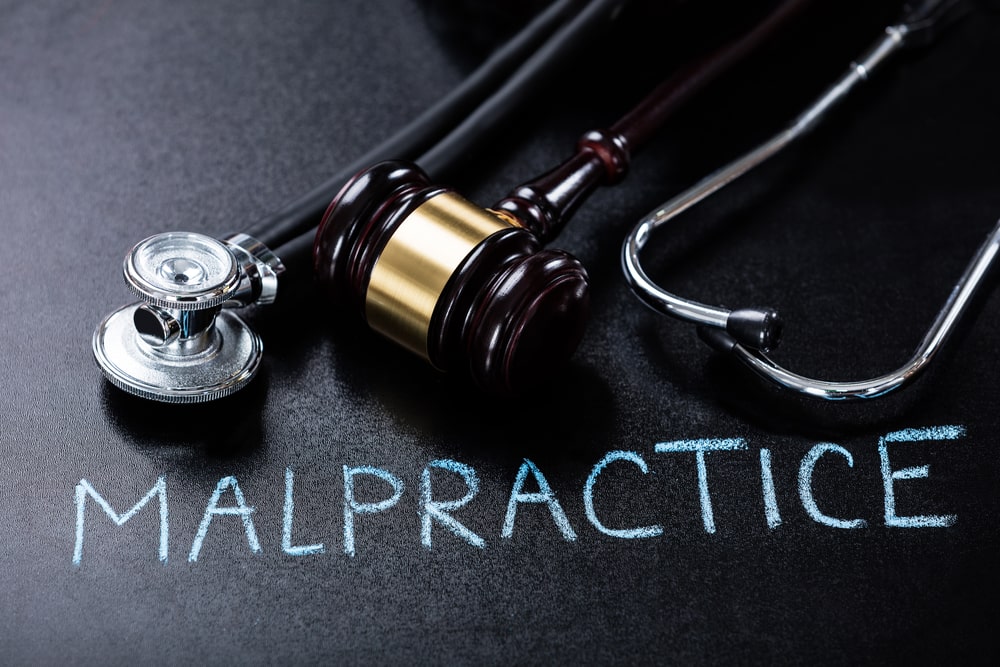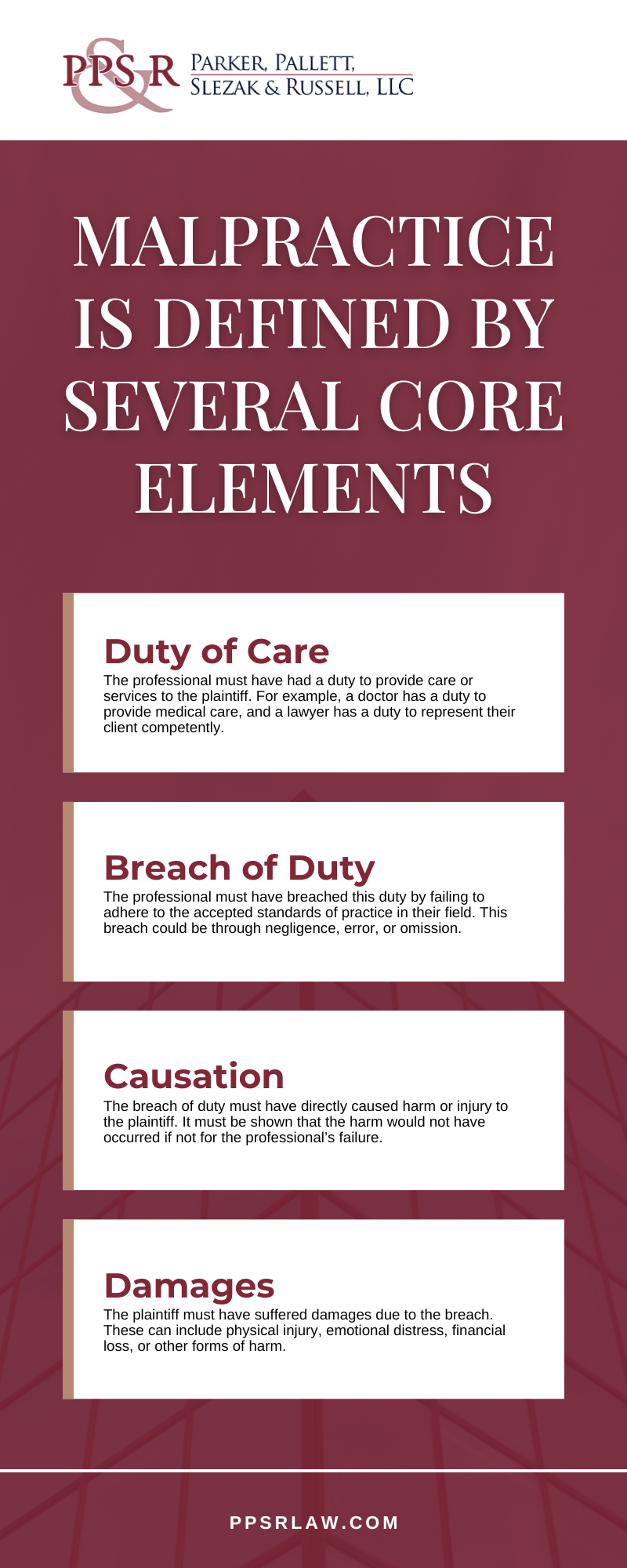
Doctors and other medical providers frequently engage in incredible work that saves the lives of many. Most doctors enter this profession so they can alleviate suffering. But they are still human and are susceptible to making mistakes. A medical error can result in a worsened condition, injury, or fatality to a patient. Our team at Parker, Pallet, Slezak & Russell, LLC are ready to speak with you if you believe a doctor made a mistake in regards to your care. Our Essex, MD medical malpractice lawyer is ready to come to your aid. All you have to do is reach out today for a consultation.
What To Know Right Now
Medical malpractice happens when a healthcare professional doesn’t offer adequate care or abide by standards of practice when treating a patient. In other words, it may be malpractice if another doctor with similar experience in an alike situation would not have made the same mistake. Injured patients may sue a doctor and/or healthcare facility if they can prove that medical negligence has occurred. What is important to know right now is that you can take action for a wrongdoing that was committed by a doctor. You may be tempted to email or send a complaint letter to the facility, however, this could work against you if they choose to edit or destroy evidence that supports your claims. The facility may go to great lengths to prevent a costly lawsuit being filed against them. Contact our dedicated medical malpractice attorney today to find out if your situation warrants legal action.
Signs Of Medical Malpractice
We want to trust that our doctors are going to take care of us if and when we need it. So realizing that medical malpractice could have happened can be a scary thing to accept. There are many examples of ways that a doctor could have committed a grave error or oversight. If you have a gut feeling that something went awry with your care, then listen to it and contact our team right away for further assistance. Here are just a few signs that medical malpractice may have happened to you:
- Lack of informed consent prior to any treatment, surgery, or procedure
- Persistent symptoms despite following treatment protocols
- Your doctor failed to order laboratory or diagnostic testing
- Your doctor failed to diagnose you with the correct illness
- Your doctor failed to diagnose you in a reasonable timeframe which led to your worsened condition
- You have unusual bleeding, swelling, or bruising after a surgery
- You have not gotten the expected results from treatment
- Your doctor ordered the wrong medical type and/or dosage
- Your doctor failed to observe harmful medication interactions
- Your doctor is dismissive of your concerns and/or questions regarding care
- The healthcare facility is understaffed
Parker, Pallet, Slezak & Russell, LLC
Finding out that your doctor may have committed a serious error when diagnosing or treating you can be terrifying. Our medical malpractice attorney can empathize with not only the stress of the situation, but having your health be negatively affected. If you have questions about a potential medical malpractice case, contact our team at Parker, Pallet, Slezak & Russell, LLC immediately for further support.
Filing A Claim For Medical Malpractice
If you have suffered from the negligence of your doctor or healthcare provider, our Essex, MD medical malpractice lawyer can help you pursue financial compensation. A medical malpractice claim can help you recover damages and receive justice after mistreatment. Our firm has been assisting clients in Maryland for 50 years. We have assisted over 50,000 clients and helped them receive the settlements that they needed to recover from an injury and get their life back on track.
Our team will work hard to pursue your financial recovery so that you can focus on your physical and mental recovery. To discover exactly how we can assist you with your case, contact Parker, Pallett, Slezak & Russell, LLC today to schedule a consultation.
Understanding Medical Malpractice
Medical malpractice refers to negligent, reckless, or malicious actions carried out by a healthcare provider that leads to harm for their patient. Medical providers are held to a high standard of care, and a failure to uphold that responsibility can lead to devastating physical, financial, and mental injuries for a patient. A misdiagnosis or failure to diagnose, error in medication, surgical error, sloppy procedure, premature discharge, and other examples of inadequate or harmful care can all constitute medical malpractice.
Medical malpractice claims can be difficult to prove, which is why the assistance of our experienced Essex medical malpractice attorney is so valuable. To prove that malpractice has occurred, it must be proven that the healthcare provider owed you a duty of care, breached the duty of care either through an action that they took or the failure to take action, that their breach of care directly lead to your injuries and losses, and that these injuries and losses caused damages. These damages may be physical, mental, emotional, or financial.
How Our Medical Malpractice Lawyer Can Assist You
There is a high standard of proof for medical malpractice claims. Our MD medical malpractice lawyer will investigate your case thoroughly and gather all evidence related to your treatment and your injuries in order to prove negligence on behalf of the healthcare provider. We will then represent you in all negotiations with the insurance company, fighting back against any attempts to undermine your claim or undervalue the compensation that you deserve. The exact amount of compensation that you may be eligible to receive will depend on the details of your specific case, but this compensation often includes payment for medical bills and expenses, lost wages, pain and suffering, and more. To ensure that you are pursuing the full extent of compensation possible, contact our team today.
Professional Representation That Cares
Our team knows how devastating cases of medical malpractice can be for victims. From severe physical pain to emotional distress and high financial costs, the consequences of medical negligence can be monumental. It is our job to fight back to protect your rights and deliver compensation that will help you finance your recovery and move forward after such a traumatic experience. To discuss your case with our team contact Parker, Pallett, Slezak & Russell, LLC today.
Steps In A Malpractice Lawsuit
When an Essex medical malpractice lawyer files a lawsuit on their client’s behalf, the goal is to obtain compensation for damages resulting from the professional’s failure to meet accepted standards of care. Here’s a comprehensive overview of malpractice lawsuits. Contact Parker, Pallet, Slezak & Russell, LLC for more details.
Understanding Malpractice
Malpractice occurs when a professional fails to perform their duties with the skill, care, or diligence expected in their field, leading to harm or injury to a client or patient. In healthcare, this might involve errors in diagnosis, treatment, or surgical procedures. In law, it could include failing to meet legal deadlines or providing inadequate representation. Malpractice is defined by several core elements:
- Duty of Care: The professional must have had a duty to provide care or services to the plaintiff. For example, a doctor has a duty to provide medical care, and a lawyer has a duty to represent their client competently.
- Breach of Duty: The professional must have breached this duty by failing to adhere to the accepted standards of practice in their field. This breach could be through negligence, error, or omission.
- Causation: The breach of duty must have directly caused harm or injury to the plaintiff. It must be shown that the harm would not have occurred if not for the professional’s failure.
- Damages: The plaintiff must have suffered damages due to the breach. These can include physical injury, emotional distress, financial loss, or other forms of harm.
Filing A Malpractice Lawsuit
Filing a malpractice lawsuit involves several steps:
- Consultation with an Attorney: The first step is to consult a lawyer specializing in malpractice cases. They will evaluate the claim’s validity, gather evidence, and determine if there is a reasonable basis for the lawsuit.
- Gathering Evidence: The plaintiff and their attorney must collect relevant evidence to support the claim. This includes medical records, expert opinions, documentation of damages, and any other relevant information that proves the breach of duty and causation.
- Filing the Complaint: If the attorney determines there is a case, they will file a legal complaint with the court. This document outlines the allegations, the legal basis for the claim, and the damages sought.
- Discovery Process: During discovery, both parties exchange information and evidence related to the case. This process can involve depositions, interrogatories, and requests for documents.
- Settlement Negotiations: Many malpractice cases are resolved through settlements before reaching trial. Settlements involve negotiations between parties to agree on compensation without proceeding to court.
- Trial: If a settlement cannot be reached, your Essex medical malpractice lawyer will not hesitate to go to trial. Both sides present their evidence and arguments, and a judge or jury determines the outcome. The plaintiff must prove their case by a preponderance of the evidence.
- Appeals: After a verdict, either party may appeal the decision if they believe there were legal errors or disagree with the outcome. The appeals process can lead to a higher court reviewing the case.
Types Of Damages In Malpractice Lawsuits
Damages awarded in malpractice lawsuits can be categorized into several types:
- Economic Damages: These cover measurable financial losses, such as medical expenses for treatment of injuries, lost wages, and costs of future care. Economic damages are intended to reimburse the plaintiff for direct financial harm.
- Non-Economic Damages: These compensate for intangible losses, such as pain and suffering, emotional distress, loss of enjoyment of life, and other impacts on the plaintiff’s quality of life. Non-economic damages are more subjective and are meant to address the emotional and psychological effects of the harm.
- Punitive Damages: Punitive damages may be awarded in cases where the professional’s conduct is deemed particularly egregious or malicious. These damages are intended to punish the wrongdoer and deter similar behavior in the future. They are not directly related to the plaintiff’s losses but focus on the defendant’s actions.
Challenges And Considerations
Malpractice lawsuits can be complex and challenging. Key considerations include:
- Statutes of Limitation: Statutes of limitation, or time limits within which a malpractice claim must be filed, vary by jurisdiction and type of malpractice.
- Expert Testimony: Proving malpractice often requires expert testimony to establish the standard of care and how the professional’s actions deviated from it.
- Proof of Causation: Demonstrating that the professional’s breach directly caused the harm can be difficult. The plaintiff must clearly link the breach and the damages suffered.
- Costs and Time: Malpractice lawsuits can be expensive and time-consuming. Legal fees, expert witness costs, and litigation can be significant burdens.
Call Our Personal Injury Law Firm Today
Malpractice lawsuits play a critical role in holding professionals accountable for their failures and seeking justice for those harmed. By understanding the process and the types of damages available, plaintiffs can better navigate the complexities of these legal actions.
If you have been injured due to the negligence of a medical professional, call Parker, Pallet, Slezak & Russell, LLC to schedule a free and confidential consultation with a dedicated Essex medical malpractice lawyer and find out what legal recourse you may have.
Essex Medical Malpractice Infographic

Essex Medical Malpractice FAQs
Medical malpractice is a complex and often misunderstood area of law. It occurs when a healthcare professional fails to provide the standard of care expected in their field, leading to injury or harm to a patient. Understanding the different types of medical malpractice can help patients recognize potential issues and know their rights. An Essex, MD medical malpractice lawyer can help victims obtain the financial compensation they may be entitled to for their losses. The following is a brief overview of these events. Call Pallet, Slezak & Russell, LLC for more information regarding your situation.
What Are The Different Types Of Medical Malpractice?
Medical malpractice encompasses several types of negligent actions or omissions by healthcare providers. Some common types include:
- Surgical Errors: Surgical errors are among the most severe forms of medical malpractice. These can include operating on the wrong body part, leaving instruments inside the patient after surgery, or performing unnecessary procedures. Such errors can lead to significant complications, additional surgeries, and even death.
- Misdiagnosis or Delayed Diagnosis: Misdiagnosis occurs when a healthcare provider incorrectly identifies a patient’s condition, leading to inappropriate or delayed treatment. A delayed diagnosis can also have severe implications if a condition worsens while waiting for the correct diagnosis. Both scenarios can result in a patient’s health deteriorating, causing further complications or prolonging suffering.
- Medication Errors: Medication errors can happen at any stage of treatment, including prescribing the wrong medication, administering incorrect dosages, or failing to account for drug interactions. These errors can result in serious adverse effects or even fatal consequences, especially for patients with underlying health conditions.
- Birth Injuries: Birth injuries occur during labor and delivery due to negligence on the part of healthcare providers. Examples include failure to monitor the fetus properly, improper use of delivery instruments, or failure to perform a timely cesarean section when complications arise. Such injuries can lead to long-term disabilities for the child, such as cerebral palsy.
How Do I Know If I Have A Medical Malpractice Case?
Determining whether you have a valid medical malpractice case involves assessing several factors. An Essex medical malpractice lawyer will look at the following to determine if you are a malpractice victim:
- Standard of Care: A medical malpractice case requires that the healthcare provider deviate from the accepted standard of care in their field. This means that another competent provider in similar circumstances would have acted differently. Consulting with a medical expert can help establish whether the standard of care was met.
- Evidence of Negligence: You must demonstrate that the healthcare provider’s actions constituted negligence. This involves showing that their actions directly caused harm or injury. Medical records, expert testimonies, and other documentation can help substantiate your claim.
- Damages: To pursue a medical malpractice case, you must have sustained damages due to the provider’s negligence. This can include medical expenses, lost wages, pain and suffering, and any long-term effects of the injury. The extent of damages will influence the potential settlement or award.
- Timeliness: Medical malpractice claims are subject to statutes of limitations, meaning you must file your case within a specific time frame after the incident. This period varies by state, so acting promptly is important if you believe you have a case.
What Is The Process For Filing A Medical Malpractice Claim?
Filing a medical malpractice claim involves several steps. Here’s an overview of the typical process:
- Consultation with a Lawyer: The first step is to consult with a medical malpractice lawyer. They can assess your case, explain your rights, and guide you through the process.
- Gathering Evidence: Your lawyer will help gather the necessary evidence to support your claim, including medical records, expert opinions, and documentation of damages.
- Filing a Complaint: If sufficient evidence exists, your lawyer will file a formal complaint in the appropriate court. This document outlines your allegations and the basis for your claim.
- Discovery and Negotiation: Both parties will enter the discovery phase to exchange evidence and information. Many cases are settled during this phase through negotiation; however, if an agreement cannot be reached, the case may proceed to trial.
What Compensation Can I Seek In A Medical Malpractice Case?
Victims of medical malpractice may be entitled to various forms of compensation, depending on the nature and extent of their injuries. Common types of compensation include:
- Medical Expenses: This covers current and future medical costs related to the injury, including surgeries, rehabilitation, and ongoing treatment.
- Lost Wages: Victims may claim compensation for lost income due to the inability to work during recovery. This can include current wages and future earning potential if the injury affects long-term employment.
- Pain and Suffering: Victims can seek compensation for the physical and emotional pain and suffering resulting from the malpractice. This can be more challenging to quantify but is crucial for achieving a fair settlement.
- Loss of Enjoyment of Life: If the injury significantly impacts the victim’s ability to engage in activities they once enjoyed, they may seek compensation for this loss.

Essex Medical Malpractice Glossary
At Parker, Pallett, Slezak & Russell, LLC, we are dedicated to helping victims of medical malpractice understand their legal options. Our Essex, MD medical malpractice lawyers are experienced in holding healthcare providers accountable. Below, we explain key terms often involved in medical malpractice claims.
Deviation From Accepted Practices
Deviation from accepted practices occurs when a healthcare provider fails to follow established medical guidelines, protocols, or procedures commonly adhered to by professionals in their field. This term refers to actions or omissions that are inconsistent with what a similarly trained and experienced provider would have done under the same circumstances.
For example, imagine a doctor treating a patient with symptoms of appendicitis but failing to order necessary diagnostic imaging, such as an ultrasound or CT scan. If the patient’s appendix ruptures as a result, this could constitute a deviation from accepted practices. In another scenario, a surgeon who neglects to verify the correct surgical site before beginning an operation may be guilty of such a deviation.
Diagnostic Errors
Diagnostic errors encompass a range of mistakes made in identifying a patient’s condition, including failure to diagnose, misdiagnosis, or delayed diagnosis. These errors can occur when a healthcare provider misinterprets test results, overlooks critical symptoms, or dismisses a patient’s concerns without adequate investigation.
For example, a patient complaining of persistent chest pain might be told they have acid reflux when, in reality, they are experiencing early signs of a heart attack. If this misdiagnosis results in delayed treatment and subsequent heart damage, it constitutes a diagnostic error. Our attorneys analyze medical records, test results, and consultation notes to determine whether a diagnostic error occurred and how it directly impacted the patient’s health.
Improper Treatment Administration
Improper treatment administration refers to errors made in the delivery of a treatment plan. These mistakes can range from selecting an inappropriate treatment for a condition to administering a correct treatment incorrectly or failing to adjust the plan as the patient’s condition evolves.
For instance, administering a high-dose chemotherapy regimen to a patient without conducting genetic testing to assess tolerance can lead to severe complications. Similarly, failing to halt treatment when adverse reactions occur, such as severe allergic responses, could also fall under improper treatment administration.
At Parker, Pallett, Slezak & Russell, LLC, we examine every aspect of the treatment process, including the provider’s decisions and follow-up actions, to uncover errors that harmed the patient.
Postoperative Complications From Negligent Care
Postoperative complications from negligent care occur when a healthcare provider fails to adequately monitor, treat, or address a patient’s condition after a surgical procedure. Proper postoperative care includes monitoring for infections, ensuring adequate pain management, and responding to symptoms that suggest complications, such as blood clots, internal bleeding, or organ failure.
For example, a patient who develops sepsis after surgery due to undetected surgical site infections may have a strong case for malpractice if the signs of infection were present but ignored. Another example might involve a surgeon failing to remove all surgical instruments or sponges from the patient’s body, causing severe pain and requiring additional corrective surgery.
We thoroughly review postoperative reports, nursing notes, and hospital protocols to determine whether appropriate care was provided during the recovery period.
Medication Mismanagement
Medication mismanagement involves errors in prescribing, dispensing, or monitoring drugs given to patients. This term includes prescribing the wrong medication, giving an incorrect dosage, failing to review potential drug interactions, or neglecting to monitor the patient for adverse reactions after administering the medication.
For example, a patient with a known penicillin allergy who is prescribed an antibiotic containing penicillin may experience a life-threatening allergic reaction. In another case, a doctor might prescribe two medications with dangerous interactions, leading to organ damage or severe side effects.
Call Our Office For Legal Help
Medical malpractice is a serious issue that can lead to devastating consequences for victims and their families. If you believe you or a loved one has been a victim of medical malpractice, seeking legal guidance from an Essex medical malpractice lawyer is essential to navigate this complex area and pursue the compensation you deserve.
Call Parker, Pallet, Slezak & Russell, LLC to schedule a free case evaluation and determine what financial justice you may be entitled to.

Contact Us Now for a Free Consultation
Fill out the form below and we will respond to you as soon as possible
Contact Us Now Form
Other Practice Areas
Client Review
"I had an amazing experience with Parker, Pallett, Slezak and Russell. My lawyer was Carmen Slezak she was amazing her and her team worked with me every step of the way. Amazing staff always an amazing atmosphere, friendly, and if you like dogs they have one or two at the office. I'm so thankful and greatful to have met the staff and feel almost like family. Thank you again Parker, Pallett, Slezak & Russell law office."
G Amato

Parker, Pallett, Slezak & Russell, LLC
11450 Pulaski Hwy
White Marsh, MD 21162
Toll free: (410) 335-3800







